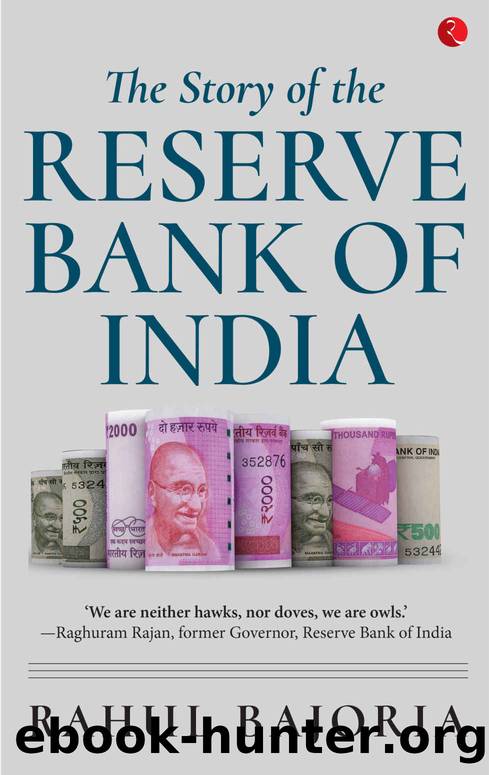The Story of the Reserve Bank of India by Rahul Bajoria

Author:Rahul Bajoria [Bajoria, Rahul]
Language: eng
Format: epub
Published: 2018-09-23T18:30:00+00:00
Chapter 12
Back to the future
India had remained largely unscathed by the Asian financial crisis. Unlike the past, the government and Reserve Bank took decisive action ahead of a crisis evolving, despite the political uncertainty that had prevailed after the 1996 elections. What was impressive was that Indiaâs external position was managed domestically through a series of measures, and the country did not have to approach multilateral agencies such as the World Bank or the IMF, not that the option was available in 1998. The exercise of raising funds through the Resurgent India Bonds scheme and tightening of policy conditions was indicative of the Reserve Bankâs long institutional memory and a testament to Finance Minister Yashwant Sinhaâs commitment to preventing a repeat of 1991 crisis.
An improving economic backdrop
At the beginning of fiscal year 1999-2000, political uncertainty returned when Prime Minister Atal Bihari Vajpayee lost his majority in the Parliament after J. Jayalalithaa, leader of the AIADMK, the southern partner of the NDA, withdrew support.361 The opposition led by Sonia Gandhi and the Congress Party also failed to cobble together a majority, and as a result, on 26 April 1999, President K.R. Narayanan dissolved the twelfth Lok Sabha.362 Political uncertainty was back, and India was heading for its fifth national election within the decade. As in the past, Atal Bihari Vajpayee and his team were asked to stay on as caretakers till such time as the elections were held and results declared.
Relative to the political backdrop, the economic backdrop was far more peaceful. By the end of May 1999, Indiaâs foreign reserves had climbed to US$33.5 billion, up from US$30 billion at the end of 1998. The currency was broadly stable at around â¹42.5 to the US dollar and optimism was returning. However, Indian equity markets had largely ignored the news reports about an escalation in firing exchanges at the line of control near Kargil, a military town about 200 kilometres from Srinagar. The matter escalated when two Indian Air Force fighter jets were shot down by Pakistan on 27 May, underscoring the seriousness of the situation.
Financial markets globally reacted negatively, and over the course of the first two weeks of June, the rupee weakened by a percent. The Reserve Bank stayed in the shadows but market intervention had likely taken place to prevent the currency from weakening further. By early July, Indiaâs victory in the Kargil battle looked imminent and equity markets zoomed higher on the back of a large funds inflow363 and falling inflation. The rupee was not allowed to appreciate by the Reserve Bank, but the pace of depreciation somewhat subsided and foreign reserves remained broadly flat. While the Reserve Bank played a minor role, its employees did contribute a dayâs salary for the armyâs welfare.364
Rising foreign exchange reserves
By the end of the Kargil war, Indiaâs foreign policy equations had changed dramatically. This had positive effects on the economy as the foreign sanctions imposed against India were poised to be removed, largely due to the improving relations with the United States post the skirmish.
Download
This site does not store any files on its server. We only index and link to content provided by other sites. Please contact the content providers to delete copyright contents if any and email us, we'll remove relevant links or contents immediately.
International Integration of the Brazilian Economy by Elias C. Grivoyannis(110060)
The Radium Girls by Kate Moore(12018)
Turbulence by E. J. Noyes(8040)
Nudge - Improving Decisions about Health, Wealth, and Happiness by Thaler Sunstein(7692)
The Black Swan by Nassim Nicholas Taleb(7106)
Rich Dad Poor Dad by Robert T. Kiyosaki(6612)
Pioneering Portfolio Management by David F. Swensen(6288)
Man-made Catastrophes and Risk Information Concealment by Dmitry Chernov & Didier Sornette(6005)
Zero to One by Peter Thiel(5786)
Secrecy World by Jake Bernstein(4741)
Millionaire: The Philanderer, Gambler, and Duelist Who Invented Modern Finance by Janet Gleeson(4465)
The Age of Surveillance Capitalism by Shoshana Zuboff(4275)
Skin in the Game by Nassim Nicholas Taleb(4239)
The Money Culture by Michael Lewis(4198)
Bullshit Jobs by David Graeber(4179)
Skin in the Game: Hidden Asymmetries in Daily Life by Nassim Nicholas Taleb(3989)
The Dhandho Investor by Mohnish Pabrai(3758)
The Wisdom of Finance by Mihir Desai(3734)
Blockchain Basics by Daniel Drescher(3574)
